GALLUP NEWS SERVICE
PRINCETON, NJ -- The well-established phenomenon of Americans rallying behind their leaders and the country in times of crisis has now taken hold with the Iraq war underway. Three days after President Bush announced the "opening stages" of war, a Gallup Poll recorded a 24-point surge in the percentage of Americans saying they are satisfied with the way things are going in the country, and a 13-point rise in public approval for the way Bush is handling his job. According to the March 22-23 poll, six in 10 Americans are now satisfied with the direction of the country, and 71% approve of Bush's job performance.
|
Direction of the U.S. |
President Bush's Job Performance |
||||
|
Satisfied |
Dissatisfied |
Approve |
Disapprove |
||
|
Post-war (March 22-23) |
60% |
38 |
71 |
25 |
|
|
Pre-war (early to mid-March) |
36% |
61 |
58 |
38 |
|
Also, in a major change from February, two-thirds of Americans are currently satisfied with the position of the United States in the world. Last month, fewer than half were satisfied.
| Position of the United States in the World Today |
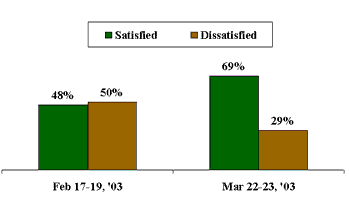 |
These enhanced evaluations of the state of the country are in addition to a recent boost in public support for military action against Iraq. Earlier this month, just 59% of Americans were in favor of sending U.S. ground troops to Iraq. That figure edged higher as the war approached and, now that war is underway, 72% say they support it.
Previous Rallies
The current Iraq war rally is reminiscent of public reaction to the start of the 1991 Gulf War led by President Bush's father, as well as to the Sept. 11, 2001, terrorist attacks against the United States. In both cases, public approval for the way the president was handling his job and public satisfaction with the direction of the country expanded greatly within a few days of the event.
The 24-point increase seen today in public satisfaction with the way things are going in the nation is slightly higher than the 18-point bounce in this measure found after Sept. 11, but is slightly lower than the 30-point increase seen at the outset of the 1991 Gulf War.
The 13-point rally in public approval for George W. Bush is slightly lower than the 18-point bounce (rising from 64% to 82%) the elder Bush earned in 1991, and is substantially lower than the 35-point bounce (from 51% to 86%) in support for George W. Bush due to Sept. 11.
Gallup polling suggests that the presidential approval rallies spurred by both Iraq wars are much stronger compared to other military events in the nation's recent history. An exhaustive review of poll data by Gallup analysts, conducted more than a decade ago, found that prior to the 1991 Gulf War, presidents' approval ratings had increased by no more than 11 points surrounding a U.S. led military strike or invasion (based, of course, on decades in which there was frequent public opinion polling). This review spanned a wide range of events, including President Kennedy's 1961 Bay of Pigs invasion of Cuba, the first bombing of Hanoi and Haiphong in 1966 under President Johnson, the invasion of Grenada in 1983 under Ronald Reagan, as well as the invasion of Panama by Bush in 1989.
In this historical context, the current Bush's 13-point rally in public approval appears quite strong.
Who is Rallying?
For the most part it is Democrats and independents who have become more positive about Bush and the state of the nation since the commencement of war with Iraq, and who are most responsible for driving these ratings up. Republicans were already highly positive about the president and the position of the country prior to the start of war.
This pattern is seen most clearly in ratings of President Bush. In Gallup's last poll before the start of hostilities with Iraq, 92% of Republicans, compared with 50% of independents and only 31% of Democrats, approved of the job Bush was doing as president. In the first poll conducted during the Iraq war (fielded March 22-23) Republican approval had increased only two points to 94%, but approval among independents rose 19 points to 69%, and rose 17 points to 48% among Democrats. As a result, Bush's overall job rating improved 13 points, going from 58% before the war, to 71% immediately after its start.
| Bush Job Approval Before/After Start of Iraq War |
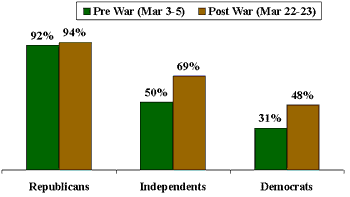 |
This same pattern is seen with public support for the Iraq war: Republicans were largely supportive before it began, and therefore showed only slightly higher support once it started. Over the same period, support for the war rose substantially among independents and Democrats. The following chart presents the shift on the basis of where public attitudes stood in early March. Polling in mid-March, before the war began, showed attitudes already shifting in favor of taking military action, only to increase further once Bush ordered the invasion.
| Support for Iraq War Before/After Start of Iraq War |
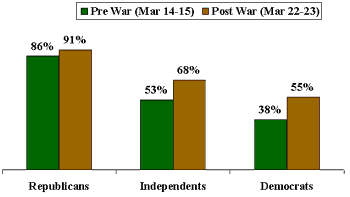 |
The pattern of public satisfaction with the United States' position in the world is more muted. Although the biggest jumps in satisfaction on this measure were seen among Democrats and independents, Republican satisfaction also grew by a fairly large amount, from 73% satisfied in early March to 87% satisfied this past weekend.
| Satisfaction With U.S. Position in the
World Before/After Start of Iraq War |
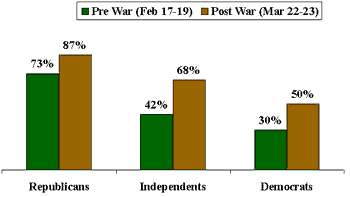 |
The picture of public satisfaction with the way things are going in the country is a bit different, generally. Satisfaction jumped substantially among all partisan groups on this measure, although to the greatest extent among independents (+31 points), followed by Republicans (+25), with Democrats showing the least change (+14).
| Satisfaction With U.S. Generally Before/After Start of Iraq War |
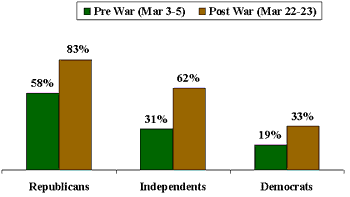 |
The following table summarizes these partisan shifts across all four dimensions of public opinion about the president, the nation, and the war.
|
Shift in Public Attitudes Pre/Post Start of Iraq War
|
||||
|
National Adults |
Republicans |
Independents |
Democrats |
|
|
Bush approval |
+13 |
+2 |
+19 |
+17 |
|
Satisfaction with the U.S. generally |
+24 |
+25 |
+31 |
+14 |
|
Satisfied with U.S. position in world |
+21 |
+14 |
+26 |
+20 |
|
Support for Iraq War |
+13 |
+4 |
+15 |
+17 |
The Holdouts
Overall, the percentage of war opponents has declined since the hostilities officially began. According to the latest poll, 25% of Americans oppose the war, down slightly from the 33% recorded in mid-March, and from 37% earlier this month. Gallup polling indicates that many of those who shifted in favor of the war continue to have doubts about the merits of it, but want to show their support for the troops.
Although the number of war opponents has shrunk, those remaining in this category are as critical of the president and the direction of the country today as they were before the war started. Only 18% of this group approve of the job Bush is doing as president. The same percentage, 18%, is satisfied with the way things are going in the United States at this time, and just 22% are satisfied with the U.S. position in the world.
Survey Methods
These results are based on telephone interviews with a randomly selected national sample of 1,020 adults, 18 years and older, conducted March 22-23, 2003. For results based on this sample, one can say with 95 percent confidence that the maximum error attributable to sampling and other random effects is plus or minus 3 percentage points. In addition to sampling error, question wording and practical difficulties in conducting surveys can introduce error or bias into the findings of public opinion polls.
On the whole, would you say that you are satisfied or dissatisfied with the position of the United States in the world today?
|
Satisfied |
Dissatisfied |
No opinion |
|
|
% |
% |
% |
|
|
2003 Mar 22-23 |
69 |
29 |
2 |
|
2003 Feb 17-19 |
48 |
50 |
2 |
|
2003 Feb 3-6 |
55 |
43 |
2 |
|
2002 Feb 4-6 |
71 |
27 |
2 |
|
2001 Feb 1-4 |
67 |
30 |
3 |
|
2000 May 18-21 |
65 |
33 |
2 |
|
1966 Sep 8-13 |
44 |
46 |
10 |
|
1965 Aug 5-10 |
43 |
48 |
8 |
|
1962 Jul 18-23 |
44 |
45 |
12 |
Do you favor or oppose the U.S. war with Iraq?
|
Favor |
Oppose |
No opinion |
|
|
2003 Mar 22-23 |
72% |
25 |
3 |
TRENDS FOR COMPARISON:
Do you approve or disapprove of the United States' decision to go to war with Iraq?
|
Approve |
Disapprove |
No opinion |
|
|
2003 Mar 20 ^ |
76% |
20 |
4 |
|
^ Polls conducted entirely in one day, such as this one, are subject to additional error or bias not found in polls conducted over several days. |
|||
Would you favor or oppose invading Iraq with U.S. ground troops in an attempt to remove Saddam Hussein from power?
|
Favor |
Oppose |
No opinion |
||
|
% |
% |
% |
||
|
2003 Mar 14-15 ^ |
64 |
33 |
3 |
|
|
2003 Mar 3-5 |
59 |
37 |
4 |
|
|
2003 Feb 24-26 |
59 |
37 |
4 |
|
|
2003 Feb 17-19 |
59 |
38 |
3 |
|
|
2003 Feb 7-9 |
63 |
34 |
3 |
|
|
2003 Jan 31-Feb 2 |
58 |
38 |
4 |
|
|
2003 Jan 23-25 |
52 |
43 |
5 |
|
|
2003 Jan 10-12 |
56 |
38 |
6 |
|
|
2003 Jan 3-5 ^ |
56 |
39 |
5 |
|
|
2002 Dec 19-22 ^ |
53 |
38 |
9 |
|
|
2002 Dec 16-17 ^ |
58 |
35 |
7 |
|
|
2002 Dec 9-10 |
55 |
39 |
6 |
|
|
2002 Nov 22-24 |
58 |
37 |
5 |
|
|
2002 Nov 8-10 |
59 |
35 |
6 |
|
|
2002 Oct 21-22 |
54 |
40 |
6 |
|
|
2002 Oct 14-17 ^ |
56 |
37 |
7 |
|
|
2002 Oct 3-6 |
53 |
40 |
7 |
|
|
2002 Sep 20-22 ^ |
57 |
38 |
5 |
|
|
2002 Sep 13-16 † |
57 |
39 |
4 |
|
|
2002 Sep 5-8 ^ † |
58 |
36 |
6 |
|
|
2002 Sep 2-4 † |
58 |
36 |
6 |
|
|
2002 Aug 19-21 † |
53 |
41 |
6 |
|
|
2002 Jun 17-19 ^ † |
61 |
31 |
8 |
|
|
2001 Nov 26-27 ‡ |
74 |
20 |
6 |
|
|
2001 Feb 19-21 ‡ |
52 |
42 |
6 |
|
|
1993 Jun 29-30 ‡ |
70 |
27 |
3 |
|
|
1992 Mar 30-Apr 5 ‡ ? |
55 |
40 |
5 |
|
|
^ |
Asked of half sample. |
|||
|
† |
WORDING: Would you favor or oppose sending American ground troops to the Persian Gulf in an attempt to remove Saddam Hussein from power in Iraq? |
|||
|
‡ |
WORDING: Would you favor or oppose sending American troops back to the Persian Gulf in order to remove Saddam Hussein from power in Iraq? |
|||
|
? |
Life Magazine/Gallup. |
|||
TREND FOR COMPARISON:
Do you approve or disapprove of the U.S. decision to go to war with Iraq in order to drive the Iraqis out of Kuwait?
|
Approve |
Disapprove |
No opinion |
|
|
% |
% |
% |
|
|
1991 Feb 14-17 |
79 |
17 |
4 |
|
1991 Jan 30-Feb 2 |
80 |
18 |
2 |
|
1991 Jan 23-26 |
81 |
15 |
4 |
|
1991 Jan 19-22 |
79 |
18 |
3 |
|
1991 Jan 17-20 |
80 |
15 |
5 |
